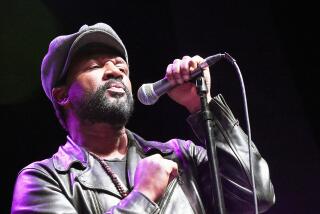A Show of Grace for Safety’s Sake
- Share via
It’s time for some ethnic profiling.
A few weeks ago, my mother and father returned to Southern California after a long stay in their native Pakistan. Spotting me outside LAX’s international terminal, my mother rushed up to hug me when she noticed something different about me: a goatee. “Get rid of that!” she said with typical maternal sensitivity that knows no geographical or cultural bounds. I responded, “But, Mom, I like it. Kinda makes me look dangerous!” She groaned, “Yes. You’ll never get on an airplane again.”
I laughed, but then wondered whether she had a point, especially since I’d soon be visiting my baby niece in Michigan. When the day arrived for my flight to Detroit, I showed up at Los Angeles International Airport wearing an Old Navy flag shirt and would have happily sported an “I carry no weapons” baseball cap if such an item were manufactured. To my surprise, I sailed through. Maybe I can’t get arrested in this town, or in my destination city, or in connecting cities. At the check-in desks and six different checkpoints, no one batted an eye at me.
Relief soon turned to irritation. Here, after all, was a youngish South Asian male traveling alone. My driver’s license could easily have belonged to another person, revealing as it did a clean-shaven person with (lamentably) a fuller head of hair than the man standing before them. By giving me an easy ride through security, the airport staff was making me--and every other traveler--much less safe.
I recalled the last time I had facial hair, a dozen years ago, during which time I traveled to Pakistan. Security staff in L.A. and London sped me along, but their counterparts in Islamabad were relentless and overbearingly cautious in ensuring that the guy with the beard was the same fellow as the unbearded person pictured in my passport. I almost didn’t make my flight back to L.A. because the Pakistani police were so intent on stopping anyone trying to get to the United States illegally.
Why the difference in approach? The American and British security personnel may have overlooked me because we “all look the same.” But more likely, the Pakistani personnel were less squeamish about ethnically profiling one of their own.
Racial and ethnic profiling can be repugnant. But they also represent a sensible aspect of human logic, tied to what social psychologists would consider a normal cognitive process called “sampling bias.” Some groups should be watched in certain benign ways.
We, the watched, have to be ready to respond with grace to real and perceived slights, whenever and wherever they may happen. Middle Eastern Christians can look to a Christ who calls on them to turn the other cheek. Muslims can look to a prophet Muhammad who was long-suffering and merciful toward Meccan authorities who had abused him during his ministry. The most compelling force on Earth is the power unleashed by the person who can take a hit with grace. And most important, a degree of sensitively handled racial profiling will make the U.S. a safer society. So stop strip-searching the little old white lady and take another gander at me the next time I come walking through LAX.
“Grow up, and that is a terribly hard thing to do,” F. Scott Fitzgerald said. “It is much easier to skip it and go from one childhood to another.” Good counsel for profiling-phobic Transportation Secretary Norman Y. Mineta and others in this nation who may be overly sensitive about profiling. In coming years, all of us will need to show the maturity that can more graciously accommodate the small and large insults of life.
More to Read
Sign up for The Wild
We’ll help you find the best places to hike, bike and run, as well as the perfect silent spots for meditation and yoga.
You may occasionally receive promotional content from the Los Angeles Times.






